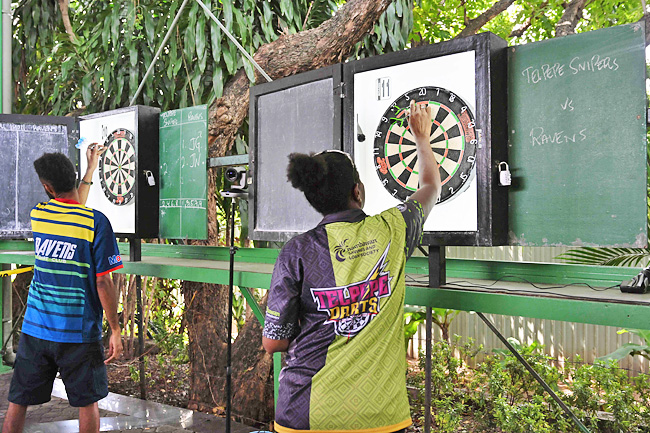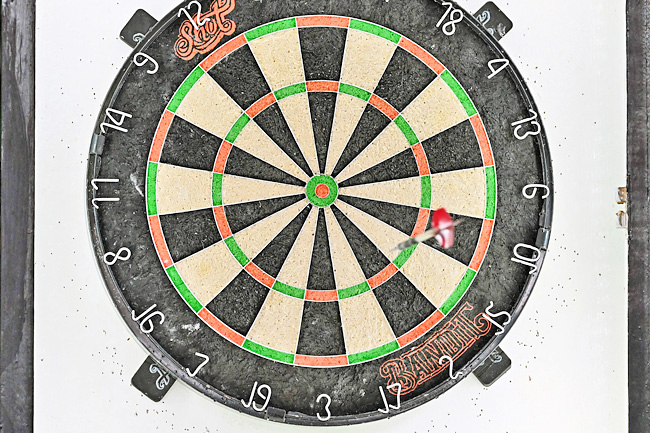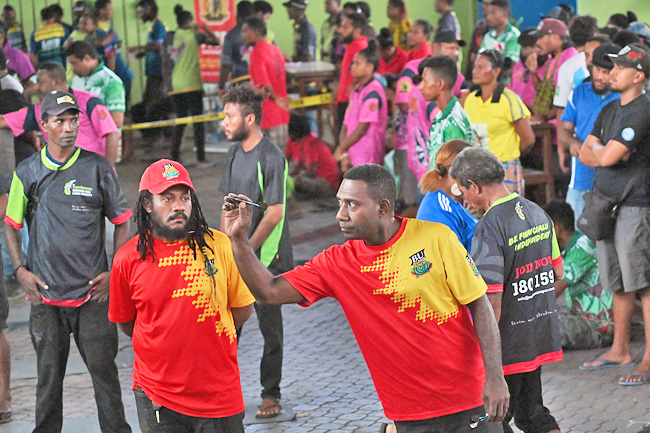PORT MORESBY, PAPUA NEW GUINEA (AFP) – At a sports club in Papua New Guinea’s rough-and-tumble capital, security guards check for weapons as players with smiles stained betel-nut red throw darts at the wall.
Around 150 Port Moresby locals have flocked to the Sports Inn to play or watch a game with origins in Middle Ages England that, half a millennium later, is setting a poor Pacific island nation alight.
Dreadlocked slinger Baxter Torie of the Telpepe Snipers pumps his fist as his teammate hits the 103 points needed to beat their nearest league rivals.
Games are taking place at this and 10 other boards, with uniformed players huddling, shouting pre-throw slogans and yelling “checkout!” when they win.
“There’s a lot of interest. Everyone’s concentrating on playing rather than socialising, we’re happy about that,” said 43-year-old Torie, who runs the games committee for the capital’s biggest darts association.
Darts is played across Papua New Guinea, with boards hung up in restaurant or next to bus stations and market stalls.



In shanty towns, locals regularly throw darts to win bottles of Coca-Cola. But things are serious now, said Torie.
Officials want the game to become an organised sport as it is in Europe, where darts moved from restaurant to razzle-dazzle arena spectacles and made the world’s top players household names.
Darts in Papua New Guinea does not enjoy that support just yet, but its popularity soared after it was the first sport allowed back during the Covid-19 pandemic.
That was because players could follow protocols such as social distancing, given that in the Pacific island country darts is not primarily considered an indoor sport.
The National Capital District (NCD) Darts Association had just a dozen teams last year, but it has 40 on the books this year and had to turn away more.
Some rural associations now boast 100 squads, according to NCD darts President Dr Kapua Kapua.
Fees for the season cost locals around PGK80 (USD23), which gets them league entry, hopes of a trophy and a potential cash prize of PGK3,000, a sizeable reward in a country where many live on a few dollars a day. Kapua, a former rugby player, said other funding has been hard to come by but hopes the game will one day become professional.
“Sponsors still see darts as a social pastime and not a sport,” he said. “But we are changing that mindset slowly.”
Kapua and Torie say late players now forfeit games, digital scoring will soon replace chalkboards and there is live-streaming for darts fans around the country.
To underscore how serious they are about developing the game, a judicial committee oversees punishments for acts of violence in a game.
“We want to stamp out troublemakers. It does reflect on the association, how the general public looks at us,” Kapua said.
Torie has also set up a games committee that includes five young volunteers – three students and two unemployed players.
They collectively earn five kina from every match in return for setting up boards and mats, a lifeline in a country where 40 per cent of the country lives below the poverty line.
“Everybody agreed to assist the boys. I’m very proud,” said Torie.
One of them, unemployed 25-year-old Ezra Rava, said playing darts has turned his life around.
“It has helped me a lot in my behaviour. We used to cause trouble. Just out on the street, fighting,” he said. “Playing darts helped us to focus on something.”
Now he practices five hours a day in his front yard, dreaming of reaching events held by the Professional Darts Corporation, the premier global darts organisation.
In a country with a poor reputation for gender equality, this darts league is also an arena where women can thrive.
Many teams in the league are filled with women playing side-by-side with male counterparts, and some are captains. “Everybody gets the same, there is no differentiation” in prize money, Kapua said.
At the national level, Papua New Guinea was recently forced to miss out on the South Pacific championships due to a lack of funding.
The country’s darts federation said it plans to rejoin the global darts body this year, allowing players to compete abroad.
Torie hopes the upward trajectory of the game means Papua New Guinea’s top players can one day hope to emulate their heroes across the world.
“If you want to be like these guys, we have to change our attitude, change the way we play, change the way we think,” he said.
“And nothing is impossible.”





